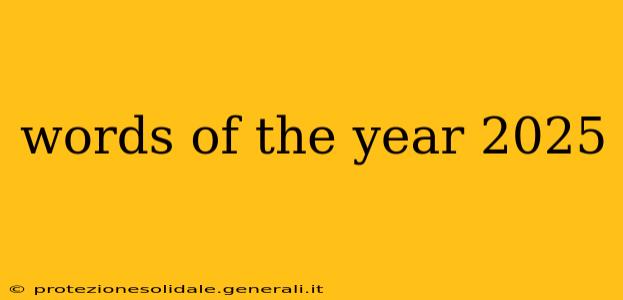The selection of "Word of the Year" is always a fascinating glimpse into the zeitgeist, reflecting the major events, trends, and anxieties of the year. While 2025 is still ahead, we can speculate on potential candidates based on current trends and emerging concerns. Predicting the exact word is impossible, but analyzing current linguistic landscapes allows us to identify potential contenders. This analysis considers various factors influencing word selection, including global events, technological advancements, and societal shifts.
What Makes a Word of the Year?
Before we dive into potential candidates, let's understand the criteria often used to select a "Word of the Year." Typically, the chosen word encapsulates the spirit of the year. It's a word that:
- Reflects major events: Think "Brexit" or "gaslighting." Global events heavily influence linguistic choices.
- Captures cultural trends: Words associated with popular movements, technologies, or social issues are strong contenders.
- Shows evolving language: Neologisms (newly coined words) or existing words with newly adopted meanings are often chosen.
- Is widely used and understood: While a niche term might be significant, widespread usage is key for a "Word of the Year."
Potential "Words of the Year" 2025: Exploring the Contenders
Several areas hold promising candidates for the 2025 "Word of the Year." These include:
1. AI-Related Terms: The Rise of Artificial Intelligence
With the rapid advancement of AI, words related to AI's impact on society are likely to emerge. This could include:
- Generative: This term has already gained traction, but if AI-generated content continues its explosive growth in 2025, "generative" could be a prime candidate.
- Algorithmic bias: As AI's role in decision-making expands, the awareness and discussion of algorithmic bias are likely to intensify, potentially pushing this phrase into the spotlight.
- Prompt engineering: This increasingly important skill for harnessing the potential of large language models might become a more mainstream term.
2. Sustainability and Climate Action: A Pressing Global Concern
The ongoing climate crisis will likely continue to dominate global conversations, leading to the rise of words related to environmental responsibility:
- Regeneration: Focusing on restoring ecosystems rather than just mitigation might make this word a strong candidate.
- Circular economy: This concept promoting resource efficiency could gain further traction and enter mainstream vocabulary.
- Eco-anxiety: As climate change impacts become more evident, this term describing anxiety about environmental damage might gain further recognition.
3. Metaverse and Virtual Reality: The Expanding Digital Landscape
The metaverse and virtual realities are constantly evolving, potentially leading to new words or the wider adoption of existing ones:
- Immersive: As VR experiences improve, this word could become even more prominent.
- Avatarization: The process of creating and using avatars in virtual worlds could become increasingly relevant.
- Digital twin: While already in use, its wider adoption across various sectors might elevate its status.
4. Geopolitical Terms: Reflecting Global Tensions
Depending on the global political climate in 2025, specific geopolitical terms might emerge. This is highly unpredictable, but words related to:
- [Specific geopolitical event/conflict]: A significant event will inevitably shape the vocabulary.
Beyond Individual Words: Trends to Watch
While a single word often summarizes the year, it's important to consider broader linguistic trends. These could include the continued rise of:
- Acronyms and abbreviations: Shortened forms are becoming increasingly common in online communication.
- Emojis and other non-verbal communication: These supplement written language and reflect changing communication styles.
Conclusion: The Future of Language in 2025
Predicting the precise "Word of the Year" for 2025 is an inherently speculative exercise. However, by analyzing current trends and considering the factors that shape linguistic choices, we can anticipate the types of words that will likely contend for the title. The chosen word will ultimately reflect the significant events, societal shifts, and technological advancements that define the year. The ongoing evolution of language ensures that 2025 will undoubtedly bring its own unique linguistic signature.
